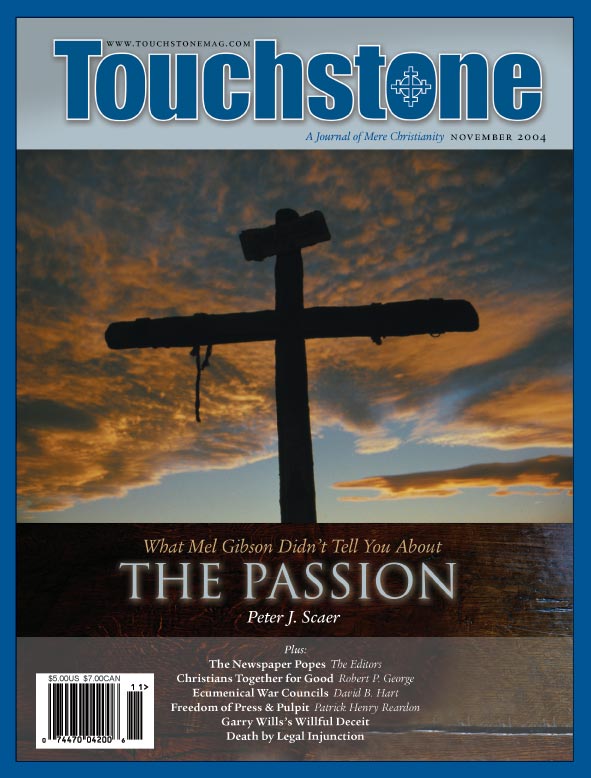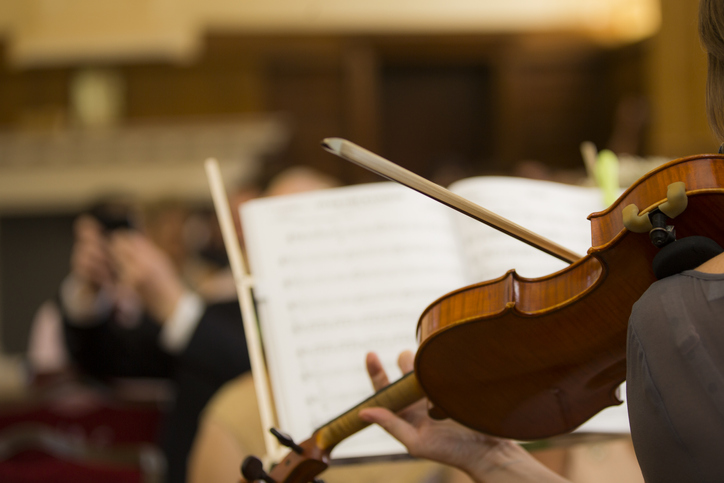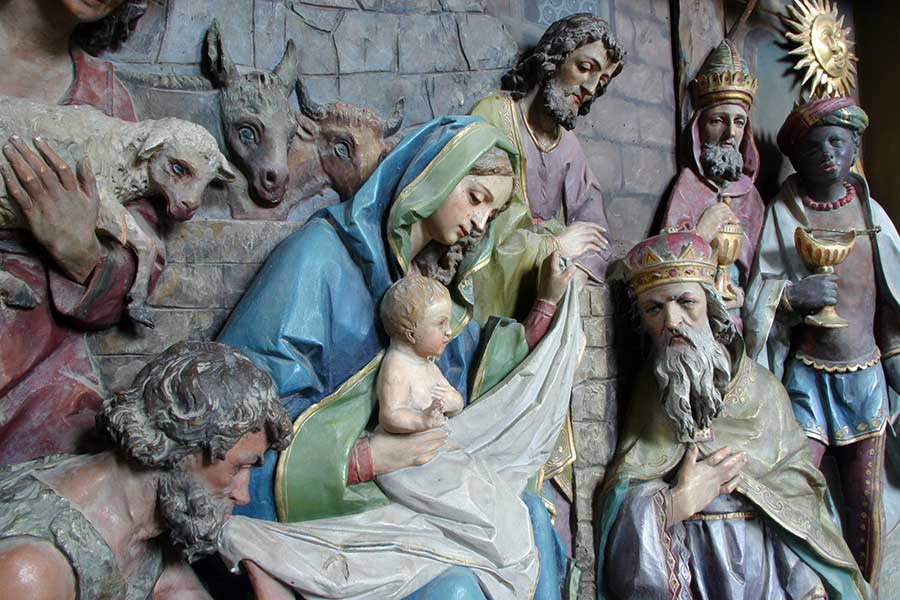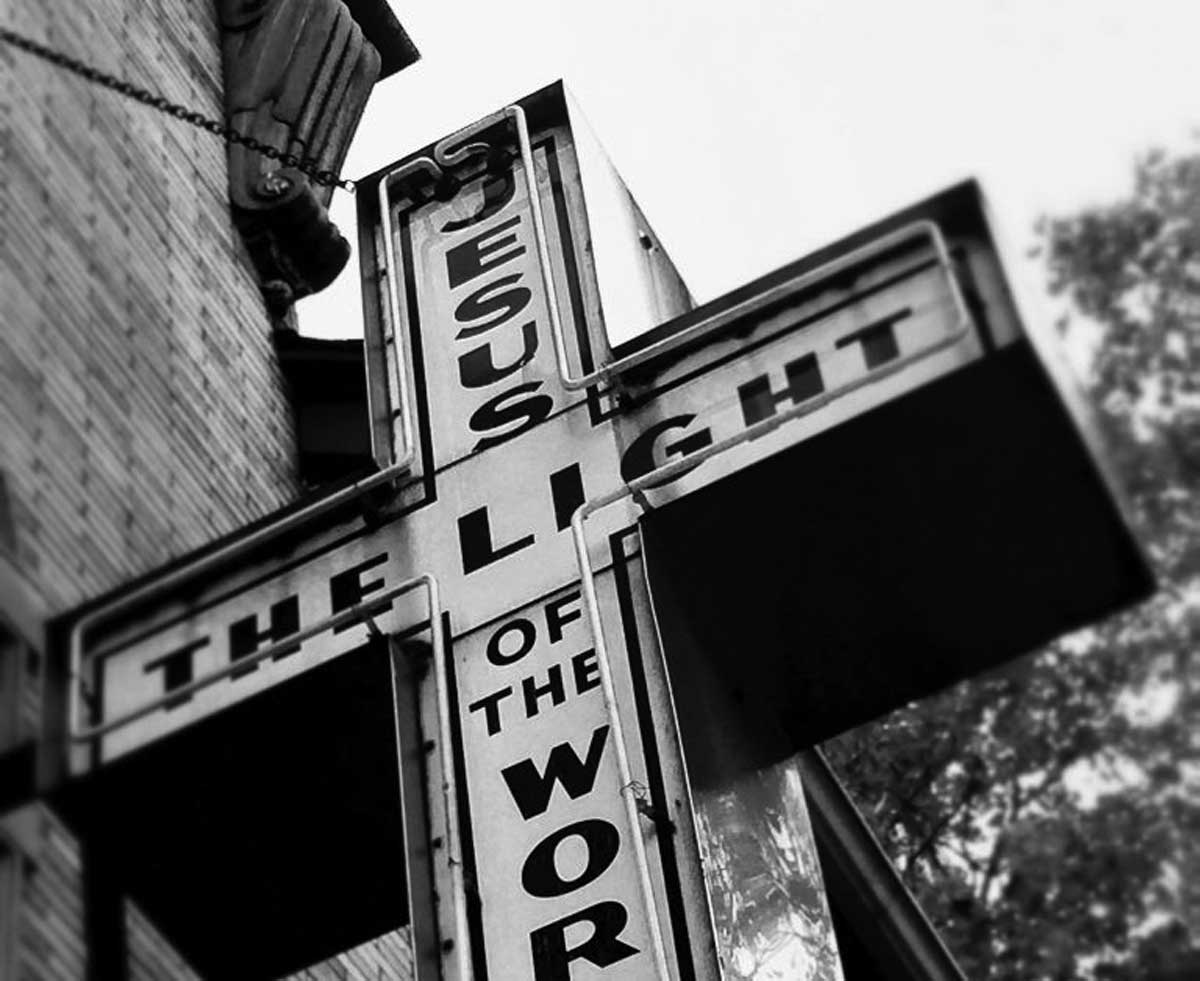Paper Popes
When the Media Decide What the Church Should Teach
In Virginia, a Catholic bishop announces that those who hold office in the Catholic Church should adhere to Catholic doctrine, and he dissolves a diocesan committee that dissented from the church’s teaching about homosexuality. A newspaper editor chastises the bishop and asserts that all such questions need to be kept open.
In St. Louis, the archbishop requires the only Catholic parish that owns its own property, independent of the archdiocese, to cease that arrangement. The media scold the archbishop for “legalism” and “rigidity.”
In New Jersey, a girl with celiac disease cannot digest Communion hosts made from wheat. The diocese suggests that she receive Communion by sipping from the chalice or receiving a tiny piece of the sacred host. Her mother asks the church to authorize hosts made from rice flour, and the media make it a major issue.
Also in St. Louis, the archbishop receives the vows of several women who have committed themselves to live as consecrated virgins. This event, seemingly quite minor amidst the day’s news, merits a front-page article in the local newspaper and a cartoon ridiculing the practice on the editorial page.
A syndicated national columnist and Pulitzer Prize winner who is not a Catholic wants to “send the Vatican hearing aids” because a recent Vatican letter fails to endorse the complete feminist agenda.
We are so used to these media blitzes—directed most frequently but by no means exclusively at the Catholic Church—that we scarcely think twice about them. What else, after all, is new? We expect such people to attack the pro-life movement, the “religious right,” home-schooling parents, Focus on the Family, the Southern Baptist Convention, the Catholic bishops (when they speak on life issues), and believing Christians in general. We expect them to make a lot of noise doing so and have blocked out the sound.
But in reality these media blitzes involve something quite troubling, and are not simply examples of the criticism Christians may expect to receive in a pluralistic society. Although in each case those who criticized the church did so in the name of “freedom,” their own agenda is actually a threat to religious liberty.
The Church’s Rights
We addressed one aspect of this in “Faith-Based Restrictions,” the lead editorial for the September issue: the increasing tendency of courts to treat religious freedom as merely the freedom to perform a set of rituals and ceremonies, and thereby to deny the right of a religious body to order its own life and participate in public affairs. Here we are addressing the ideology of the “enlightened” class that works to the same end: not only the exclusion of orthodox Christians from the public square, but the removal of their authority over their private squares.
In the controversy over the policy of some bishops that pro-abortion politicians should not receive Communion, the media have at least an apparent excuse for their interest: the claim (false though it is) that bishops should not “interfere” in politics. But the fact they obscure, and indeed effectively deny, is that the church has the right, indeed the obligation, to set its own conditions for membership.
The Catholic Church holds that women cannot be validly ordained to the priesthood, that homosexual activity is morally wrong, that Catholic politicians should not promote abortion and still receive Communion, and that valid Communion hosts must be made from wheat flour, to take four of the currently disputed issues. In effect, the critics of those positions (even if they are not Catholic) claim the right to determine who should be ordained, what kind of sexual activity the church can consider moral, who should be admitted to Communion, and what kind of Communion hosts should be used.
Who owns a parish’s property is not a matter of Catholic doctrine, but is a matter basic to the Catholic governing structure. Those who declared that the St. Louis parish should keep its property were in effect claiming that Catholics should be Congregationalists.
At work here is the self-defined “enlightened” class who claim the right to judge other people’s beliefs, even when they do not understand those beliefs—a claim that clearly contradicts the same class’s constant sermons about “respecting our differences” and “understanding the other,” their constant and undifferentiated praise of “diversity” and “pluralism,” and their constant warnings about the dangers of “imposing our values.”
A recent article in a local newspaper, typical of the genre, related how “Wiccans”—self-described witches—are now demanding and receiving respect in society. I assume the reporter is not a Wiccan, but the article was elaborately respectful, and it is inconceivable that any mainstream media organ would criticize something like Wicca, no matter how absurd some of its beliefs might be.
The average newspaper would surely treat with similar elaborate respect the decision of a Muslim group to set apart some women as consecrated virgins. It would even praise a group of secular women who chose to form a community and give up sex and marriage for some ideological end, the defense of legal abortion, for example.
Trashing the Teaching
The enlightened class obviously does not understand Christian teachings about many things, nor does it wish to, and it gives itself license to trash those teachings. Ellen Goodman thinks the Vatican needs a hearing aid because the pope does not listen to her, not that she needs to listen. If consecrated virginity, or the required use of wheaten bread, were a belief of a Native American tribe, the enlightened class would be very severe in cautioning us to respect precisely what we do not understand, and to learn from it.
There is an important issue of religious freedom here. Some legal commentators have pointed out that it is not entirely clear whether religious liberty as such exists any more. If there is such a thing as religious liberty, then it must apply to churches as a whole, not just to individuals. But that is precisely what the enlightened class now denies.
—James Hitchcock, for the editors
James Hitchcock is Professor emeritus of History at St. Louis University in St. Louis. He and his late wife Helen have four daughters. His most recent book is the two-volume work, The Supreme Court and Religion in American Life (Princeton University Press, 2004). He is a senior editor of Touchstone.
subscription options
Order
Print/Online Subscription

Get six issues (one year) of Touchstone PLUS full online access including pdf downloads for only $39.95. That's only $3.34 per month!
Order
Online Only
Subscription

Get a one-year full-access subscription to the Touchstone online archives for only $19.95. That's only $1.66 per month!
bulk subscriptions
Order Touchstone subscriptions in bulk and save $10 per sub! Each subscription includes 6 issues of Touchstone plus full online access to touchstonemag.com—including archives, videos, and pdf downloads of recent issues for only $29.95 each! Great for churches or study groups.
Transactions will be processed on a secure server.
more from the online archives
calling all readers
Please Donate
"There are magazines worth reading but few worth saving . . . Touchstone is just such a magazine."
—Alice von Hildebrand
"Here we do not concede one square millimeter of territory to falsehood, folly, contemporary sentimentality, or fashion. We speak the truth, and let God be our judge. . . . Touchstone is the one committedly Christian conservative journal."
—Anthony Esolen, Touchstone senior editor









